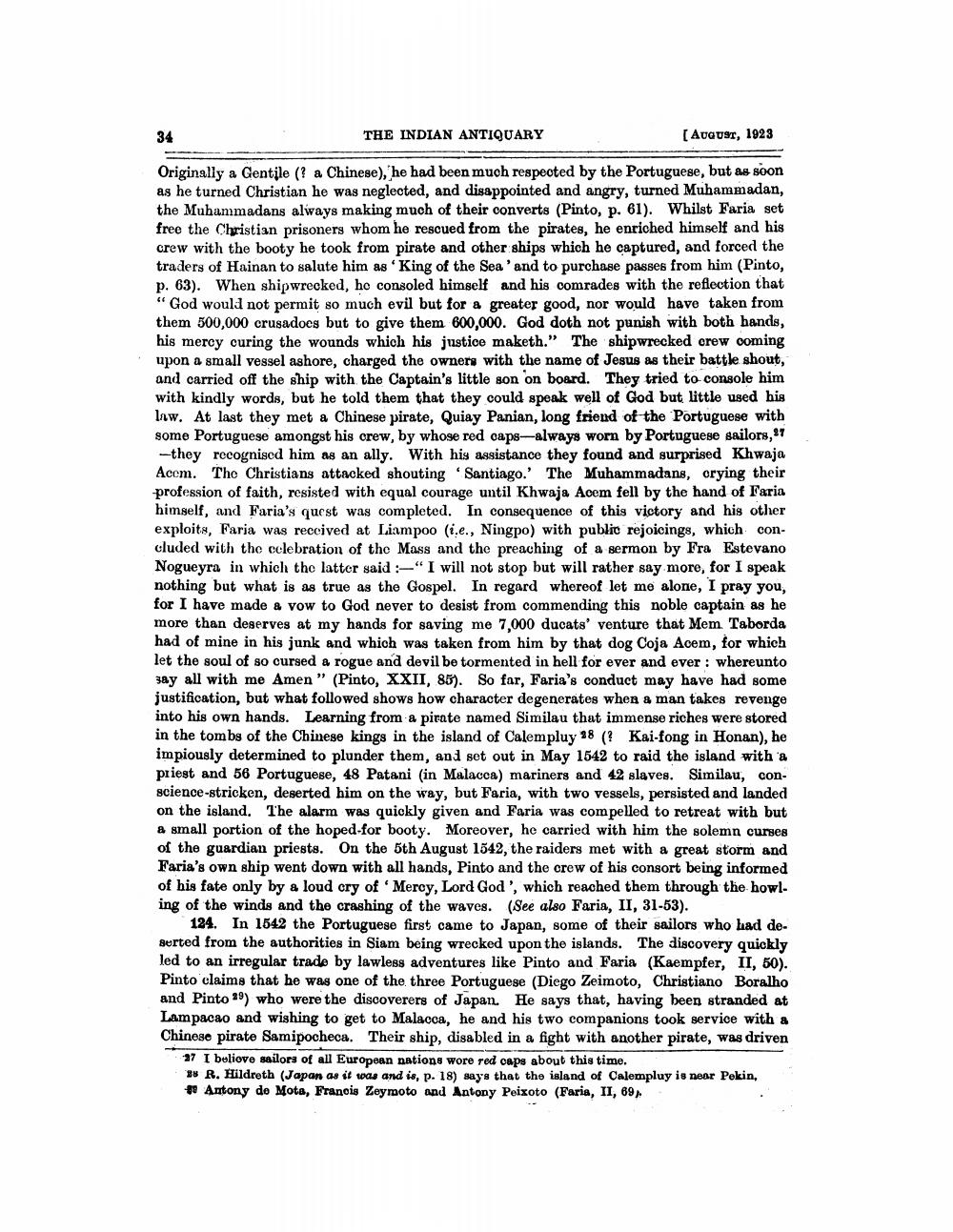________________
34
THE INDIAN ANTIQUARY
[ August, 1923
Originally a Gentile (? a Chinese), he had been much respected by the Portuguese, but as soon as he turned Christian he was neglected, and disappointed and angry, turned Muhammadan, the Muhammadans always making much of their converts (Pinto, p. 61). Whilst Faria set free the Christian prisoners whom he rescued from the pirates, he enriched himself and his crew with the booty he took from pirate and other ships which he captured, and forced the traders of Hainan to salute him as King of the Sea and to purchase passes from him (Pinto, p. 63). When shipwrecked, ho consoled himself and his comrades with the reflection that "God would not permit so much evil but for a greater good, nor would have taken from them 500,000 crusadoes but to give them 600,000. God doth not punish with both hands, his mercy curing the wounds which his justice maketh." The shipwrecked crew coming upon a small vessel ashore, charged the owners with the name of Jesus as their battle shout, and carried off the ship with the Captain's little son on board. They tried to console him with kindly words, but he told them that they could speak well of God but little used his Inw. At last they met a Chinese pirate, Quiay Panian, long friend of the Portuguese with some Portuguese amongst his crew, by whose red caps-always worn by Portuguese sailors, er
- they recognised him as an ally. With his assistance they found and surprised Khwaja Acem. The Christians attacked shouting Santiago. The Muhammadans, crying their profession of faith, resisted with equal courage until Khwaja Acem fell by the hand of Faria himself, and Faria's quest was completed. In consequence of this victory and his other exploits, Faria was received at Liampoo (i.e., Ningpo) with public rejoicings, which concluded with the celebration of the Mass and the preaching of a sermon by Fra Estevano Nogueyra in which the latter said "I will not stop but will rather say more, for I speak nothing but what is as true as the Gospel. In regard whereof let me alone, I pray you, for I have made a vow to God never to desist from commending this noble captain as he more than deserves at my hands for saving me 7,000 ducats' venture that Mem. Taborda had of mine in his junk and which was taken from him by that dog Coja Acem, for which let the soul of so cursed a rogue and devil be tormented in hell for ever and ever : whereunto say all with me Amen" (Pinto, XXII, 85). So far, Faria's conduct may have had some justification, but what followed shows how character degenerates when a man takes revenge into his own hands. Learning from a pirate named Similau that immense riches were stored in the tombs of the Chinese kings in the island of Calempluy 38 (? Kai-fong in Honan), he impiously determined to plunder them, and set out in May 1542 to raid the island with a priest and 56 Portuguese, 48 Patani (in Malacca) mariners and 42 slaves. Similau, conscience-stricken, deserted him on the way, but Faria, with two vessels, persisted and landed on the island. The alarm was quickly given and Faria was compelled to retreat with but a small portion of the hoped for booty. Moreover, he carried with him the solemn curses of the guardian priests. On the 5th August 1542, the raiders met with a great storm and Faria's own ship went down with all hands, Pinto and the crew of his consort being informed of his fate only by a loud cry of Mercy, Lord God', which reached them through the howl. ing of the winds and the crashing of the waves. (See also Faria, II, 31-53).
124. In 1542 the Portuguese first came to Japan, some of their sailors who had deserted from the authorities in Siam being wrecked upon the islands. The discovery quickly led to an irregular trade by lawless adventures like Pinto and Faria (Kaempfer, II, 50). Pinto claims that he was one of the three Portuguese (Diego Zeimoto, Christiano Boralho and Pinto 29) who were the discoverers of Japan. He says that, having been stranded at Lampacao and wishing to get to Malacca, he and his two companions took service with a Chinese pirate Samipocheca. Their ship, disabled in a fight with another pirate, was driven
17 I beliove sailors of all European nations wore red caps about this time. 3 R. Hildreth (Japan as it was and is, p. 18) says that the island of Calempluy is near Pekin, # Antony do Mota, Francis Zeymoto and Antony Peixoto (Faria, II, 69)




